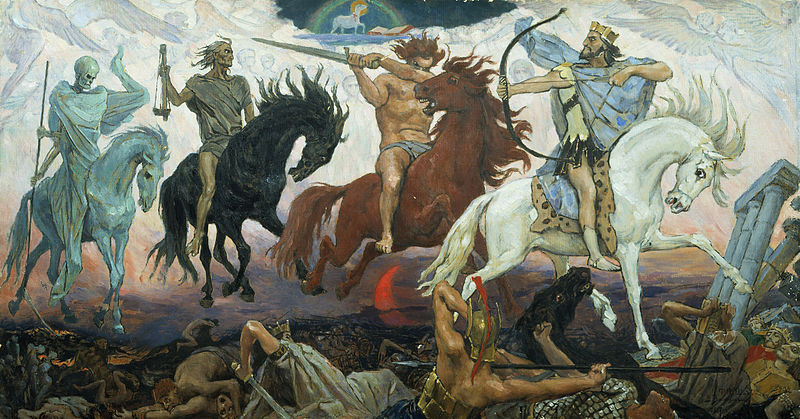So far in our journey through the book of Revelation we’ve taken a look at the preface in chapter 1, the proclamations to the seven churches in chapters 2-3, and witnessed a problem and the corresponding solution in chapters 4-5. Today we open a new chapter and a new major section of John’s apocalypse. With the seven-sealed scroll firmly in the Lamb’s grasp, the program of God’s future judgment can be revealed. Today we are going to witness the breaking of the first four seals and, as a result, come face-to-face with the infamous four horseman and the beginning of God’s judgment on the earth in Revelation 6:1-8.

a. The White Horse-6:1-2
The opening phrase of chapter 6--“Then I saw”—successfully ushers the reader into the next major section of the Book of Revelation, the process that will instigate God’s judgment on an unbelieving and sinful world. This process includes the wrath that God unleashes on the earth during a future seven-year period of tribulation that, as far as Revelation is willing to describe it, begins right here with the opening of the first seal.
The only one worthy to open this seven-sealed document (the title deed to the universe) is the humblest and most glorious Lamb introduced in chapter 5—“The I saw when the Lamb broke one of the seals” (6:1a). If the earth was created and gifted to the Son at creation (Col. 1:16) and then saved by the Son’s activity in his first coming (John 3:16-17), certainly Jesus is the only one worthy to inherit the new earth after purging it with judgment. These judgments come as the seals of this document are opened one at a time. After breaking the first of these John “heard one of the four living creatures saying as with a voice of thunder, ‘Come’” (6:1). Osborne is right to point out how involved these four living creatures are in the book of Revelation. Throughout the revelation, these creatures are shown leading worship (4:8-9; 5:8-10, 14; 19:4), surrounding the throne (4:6; 5:6, 11; 7:11; 14:3), and implementing judgments (6:1, 3, 5, 6, 7; 15:7) (Osborne, Revelation, 275). Here, in 5:1-8, the four creatures introduce the four horsemen, subtly suggesting that even as the Lamb executes the judgment by breaking the seals, the program of judgment is being determined by the throne room of heaven. The severity of the coming judgment is foreshadowed by the thunderous voice that calls forth for each of these horses with a booming “Come!” (6:1, 3, 5, 7).
The theme of sensory overload continues as after first “hearing” the commanding voice say “Come!” John then sees the first horse and its rider—“I looked, and behold, a white horse…” (6:2a). The imagery of the four horsemen is similar to what is found in Zechariah 1:7-11 and 6:1-8. There, the symbolism of the colors is not as clear as it is here in Revelation. Also, In Zechariah, the horses (red, black, white, and dappled gray) pull chariots and are sent to patrol the earth and promote peace and rest. However, in Revelation the release of these horses brings disaster. This is not without precedent as horses are often associated with conquest and war (see Job 39:19-25; Ps. 76:5-6; Prov. 21:31). However, what is peculiar about this first horse is that that theme of war and destruction is hidden behind a white façade.
The unusual nature of this first horse is accentuated by the description of its rider—“And he who sat on it had a bow; and a crown was given to him, and he went out conquering and to conquer” (6:2b). Though there are many interpretations offered for this first horse, these can be divided into two general categories: positive and negative. Those who take a positive view (Considine, Bachmann, Herzer) cite the following evidences for their position: First, this white horse may be an allusion to Ps. 45:3-5 where the rider is an Israelite king who defeats his enemies with arrows. Second, in Revelation 19:11-16, Christ who has diadems on his head, rides on a white horse and defeats his opponents. Third, in Revelation 14:14, a scene of judgment is introduced by Christ, sitting on a “white cloud,” wearing a “golden crown on his head,” carrying a weapon in his hand. Fourth, Christ is shown to conquer elsewhere in the book. Fifth, “white” is used without exception elsewhere in Revelation (14times) to describe something positive (i.e. holiness of God, saints, Christ, etc.). And sixth, the first horsemen is different from the others in a positive sense because there is no clear woe linked with him (Beale, Revelation, 375). These evidences for a Christ-like figure are not without merit, nor are they totally misplaced. However, a better case can be made for a Christ-like imposter—i.e. the Antichrist.
Those who support this view recognize the following: First, the language of “conquering” is used elsewhere of the beast oppressing the saints (see 11:7; 13:7). Second, in Zechariah 1:8-15 (a background text for Revelation 6), the horses are identified together as being the same in nature. It would follow then that if the other three horses are negative, so too must this first one be. Third, Revelation 12-13 describes Satan and his legions’ ability to imitate Christ’s appearance. Fourth, there are copious prophecies foretelling the presence of “false Christs and false prophets” who will “mislead” (Mark 13:5-6; Mat. 25:4-5; Luke 21:8). Fifth, Christ is already in this passage opening the seals. For these and other reasons Thomas concludes “if the first rider is not the Messiah, then, he must be someone resembling the Messiah…a counterfeit Christ…The book is full of satanic imitations of Christ and His conquest…this rider is one of them” (Thomas, Revelation, 422).
This horse and its rider is not the same horse and rider that will bring about total victory for God’s people in Revelation 19. That horse is ridden by Christ who is armed with a sword in his mouth and absolute authority to bring about eternal peace. The white horse of Revelation 6 is ridden by a man with a bow and authority is “given to him to conquer.” He is a coming imposter working on the earth to consolidate power under his evil reign.
b. The Red Horse-6:3-4
Now that this is established, the other three horsemen to follow can be understood as joining the white horse and his activities under the same program of coming destruction. There is, in fact a natural progression that can be witnessed in what horses emerge and in what order. Each of these horsemen and their colored steeds is introduced in the same way —“when He broke the second seal, I heard the second living creature saying, ‘Come’” (6:3).
Following this repetitive introduction, “another, a red horse, went out” (6:4). The original language describes this horse as “fiery red” and employs the same word used later of the dragon in Revelation 12. In both contexts, the color symbolizes the scope and acuity of bloodshed that will be unleased upon the earth in this future tribulation period. Such perilous slaughter is probably what Jesus foreshadowed in his Olivet discourse in Matthew 24.
Matthew 24:6-8-“You will hear of wars and rumors of wars, but see to it that you are not alarmed. Such things must happen, but the end is still to come. Nation will rise against nation, and kingdom against kingdom. There will be famines and earthquakes in various places. All these are the beginning of birth pains.” (see also Mark 13:7-8).
Even then, Jesus reveals that his disciples would hear of wars and rumors of wars “but the end is still to come.” This suggests that they (or who they represent) would not see/experience such wars themselves. By the time Revelation 6:4 comes to pass, these rumors are coming to pass and the “end” has arrived—that is the end for the world that deserves this judgment. There is little evidence to suggest that the church, as it exists today, is enduring this.
The nature of the judgement brought on by this second horse is revealed in the remainder of verse 4—“and to him who sat on it, it was granted to take peace from the earth, and that men would slay one another; and a great sword was given to him…” (6:4b). It is important to recognize that as was the case with the first horse, the authority/power this red horseman possesses has been given to him. In other words, neither he nor his fellow horsemen are ultimately in control. Instead, the one on the throne has determined their use during this period and the Lamb is the superior agent unleashing these players onto the world’s stage.
Given his description, this horseman symbolizes the coming wars that will no doubt accompany the consolidation of power that takes place under the conquering white horseman (the Antichrist). As peace is taken, men are depicted as slaying each other (“slaughtering”), and a sword is given to this red horseman, there are few other things this red steed and its rider could represent.
The sword that is given to the red horseman appears to be based on Ezekiel 21:9-15, 21 (see also Ezekiel 14), where a sword is present and is used to judge both Israel and the nations. While this might suggest the presence of God’s people on the earth during the activity of this second horseman, consider that those left on the earth at this point most likely include the lost and a mostly unsaved Israel has largely, up to this point, denied the divinity of Christ. Israel has a future and at this point in the tribulation, many Jews are left on the earth during the tribulation that will face this judgment head on. Some will turn to Christ in salvation during this period, but still others will remain in unbelief, incurring God’s wrath along with the rest of an unbelieving world.
c. The Black Horse-6:5-6
“When He broke the third seal, I heard the living creature saying, ‘Come’” (6:5a). Like clockwork and in perfect parallelism the chaos unleashed on the earth continues as the Lamb calmly and
deliberately breaks open the third seal.
This time, John says, “I looked, and behold, a black horse,…” (6:5b). Following the deceitful promise of peace and consolidation of power in the world (the white horseman) to the bloody wars that are sure to accompany conquests that centralize power under a single world ruler (the red horse) comes a black horse and an unusual rider carrying “a pair of scales in his hand” (6:6a). The scales carried by the rider appear to be a reference to Daniel 5:27 where during a decadent feast Belshazzar sees mysterious writing on the wall. Daniel’s interpretation reads of the mysterious lettering reads, “you have been weighed on the scales and found wanting.” Thereafter a greedy, idolatrous, and proud ruler meets his humiliating end in a single night. Here, the comment of the scales betrays the natural consequence of war on global food prices and markets.
John continues saying, “and I heard something like a voice in the center of the four living creatures saying, ‘A quart of wheat for a denarius, and three quarts of barley for a denarius; and do not damage the oil and the wine,’…” (6:6). A similar phenomena is described in Ezekiel 4:16—“They will dole out bread by weight. You will eat, but you will not be satisfied.” Balances, in fact, were typically used by merchants in the ancient world to weigh large quantities of coins, metal, and items such as spices (see also Lev. 26:26; John 19:39) (Wilson, Revelation ZIBBC, 289). Here, a voice from the center of the four living creatures (perhaps the One who sits on the throne), states that the price of typical staples would be significantly inflated. Wheat and barley were commonplace in the Roman empire. In fact, portions of these provisions were distributed to the city’s poor to garner political support (ancient hand-outs). While the poor ate barely (as it was cheaper) the wealthy consumed wheat-based products. A “denarius” was the average days’ wage for a laborer and a quart of wheat was enough food for one person for a day. Three quarts of barley were barely enough for a small family. These “famine prices” for food were about ten to twelve times the going rate for the same quantities of food in John’s day (Osborne, Revelation, 280). Therefore, whenever this prophecy is fulfilled, a man’s entire daily earnings will barely be enough to feed himself and/or family.
As for the final comment made in connection to the black horsemen—“do not damage the oil and the wine”—some have suggested that it mirrors an edict first given by the Roman Emperor Domitian during the time of this writing (mid-90s AD). In AD 92 Domitian issued an edict that half of the vineyards in the provinces should be cut down. The previous harvest had produced an abundance of wine but a lack of wheat, so the order was issued to correct a perceived imbalance in production (Wilson, Revelation ZIBBC, 290). Together with what has already been said about the wheat and barley, this black horse symbolizes a coming famine and global food crisis following wars that accompany a swift consolidation of power.
d. The Ashen Horse-6:7-8
As with the previous three so goes the introduction of the fourth and final horseman—“When the Lamb broke the fourth seal, I heard the voice of the fourth living creature saying, ‘Come’” (6:7).
The fourth horse that John beholds is “an ashen horse” (6:8a). Some translations read “pale green.” What he symbolizes is crystallized in the name and entourage that accompanies him—“and he who sat on it had the name Death and Hades was following with him,…” (6:8a). Death and hell are personified as forces unleashed upon the earth following after this yellowish-green decaying horse. The imagery of “following behind” pictures Hades on foot gathering up the corpses left by pestilence and death as they strike victim after victim during the tribulation (Obsborne, Revelation, 282).
Hades has a lot of collecting to do considering what John describes in verse 8—“Authority was given to them over a fourth of the earth, to kill with sword and with famine and with pestilence and by the wild beasts of the earth,…”. Notice once again that authority is being given to these characters to perform these activities; they do not possess this authority in and of themselves. That said, once empowered to enact their terror, they succeed in bringing about the kinds of conditions that kill one fourth of the earth’s population. The geo-political maneuvering, war, and social-economic stressors symbolized by the first three horses no doubt will contribute in large part to this onslaught of death. This final rider, in a way, summarizes the first three, and calls the result of all that has been unleashed up to this point “death” (Beale, Revelation, 383). However, the fourth horseman adds an additional cause of death—pestilence. Fatal diseases, perhaps brought about in part because of the implications of war and poor food supply, will be rampant on the planet, leading to huge losses of life. Even wild beasts join in on the destruction of human life.
You might already be asking yourself, can it get any worse? The short answer is yes. With every passing program of plagues (later witnessed in the trumpets and bowls) the judgment and subsequent destruction grows more and more acute. You might also be wondering, am I, a Christian, going to be enduring these dark days ahead? Clues in this passage and earlier in the book of Revelation seem to suggest that the church as it exists today is not physically present on the earth (see also 1 Thess. 4). While an unbelieving Israel and the rest of the lost world are found among the casualties listed in this and other passages, the people of God (24 elders surrounding the throne) are in the heavens awaiting the marriage supper of the Lamb (see Revelation 19). What transpires in Revelation 6-18 appears to serve two purposes: 1) It is God’s judgement of unbelieving world and 2) it is a final call to God’s old-covenant people to return to him in both an existential and spiritual way before the end.
So What?
A couple of takeaways to leave with after witnessing these four horsemen unleashed on the earth. First, God takes his judgment of a wicked an unbelieving world seriously. Second, regardless of how terrifying things look on the earth, even in the end, God is on the throne and the world’s powers are merely his pawns executing his will on the world’s stage. Take heart in this—your God will soundly punish the wrong and unbelieving ways of this fallen planet. Take comfort in this—our God is mightier than the foes we face in this or in any age.





































